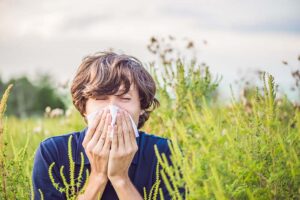Summer is a season filled with outdoor activities and vibrant blooms, but for many, it also brings the dreaded pollen and its accompanying allergies. If you or your children suffer from seasonal allergies, you know how challenging it can be to enjoy the warmer months. This blog post aims to provide you with comprehensive insights and practical tips to help you defend against pollen allergies this summer.
The Growing Concern of Seasonal Allergies
Seasonal allergies, also known as hay fever or allergic rhinitis, are becoming increasingly common. According to the American College of Allergy, Asthma & Immunology, nearly 8% of adults in the United States experience hay fever.
The rise in seasonal allergies can be attributed to various factors, including changing weather and increased pollen production. With longer growing seasons and higher pollen counts, more people are finding themselves affected by allergies. For parents, this means extra vigilance in protecting their children from the discomfort and disruption that allergies can cause.
In this blog post, we will explore the symptoms and triggers of pollen allergies, their impact on daily life, and effective strategies to manage and reduce exposure to allergens. Whether you’re an allergy sufferer or a parent looking to protect your children, you’ll find valuable information to help you enjoy a healthier, more comfortable summer.
Understanding Pollen Allergies Common Symptoms and Triggers
Pollen allergies occur when your immune system mistakenly identifies pollen as a harmful substance. This triggers a series of reactions designed to expel the pollen from your body, leading to various symptoms.
 Common symptoms of pollen allergies include:
Common symptoms of pollen allergies include:
- Sneezing and runny nose
- Itchy eyes, nose, and throat
- Watery eyes
- Nasal congestion
These symptoms can vary in severity, from mildly annoying to severely disruptive. If you or your child experiences these symptoms regularly during the pollen season, it’s likely due to a pollen allergy.
The most common triggers for pollen allergies are tree, grass, and weed pollens. Different types of pollen peak at different times of the year, so understanding which pollen affects you can help you take proactive measures. For example, tree pollen is most prevalent in the spring, while grass pollen peaks in the summer, and weed pollen is more common in the fall.
How Allergies Affect School and Play
Pollen allergies can significantly impact daily life, affecting everything from work performance to school attendance and outdoor playtime. Understanding these impacts can help you take steps to mitigate them.
Children with pollen allergies may face challenges at school. Symptoms can disrupt their ability to focus on lessons and participate in activities. Additionally, frequent absences due to allergy-related illnesses can affect their academic performance and social interactions.
Outdoor activities and playtime are also affected by pollen allergies. Many children look forward to playing outside during the summer, but high pollen counts can limit their time outdoors. This can lead to frustration and a sense of missing out on fun experiences.
Seasonal Allergy Management Tips for Reducing Exposure
Managing allergies involves a combination of strategies to reduce exposure to pollen and alleviate symptoms. Here are some practical tips to help you get started.
- Monitor Pollen Counts: Keep an eye on local pollen forecasts and plan outdoor activities when pollen levels are lower. Many weather websites and apps provide daily pollen counts and forecasts.
- Keep Windows Closed: During high pollen days, keep windows and doors closed to prevent pollen from entering your home or car. Use air conditioning to maintain a comfortable indoor temperature.
- Shower After Outdoor Activities: Pollen can stick to your skin and hair, so it’s essential to shower and change clothes after spending time outside. This helps remove any pollen you may have brought indoors.
- Use HEPA Filters: High-efficiency particulate air (HEPA) filters can help reduce pollen and other allergens in your home. Consider using HEPA filters in your HVAC system and vacuum cleaner.
- Wear Sunglasses: Wearing sunglasses can help protect your eyes from pollen, reducing irritation and discomfort.
By incorporating these tips into your routine, you can minimize your exposure and reduce the severity of your allergy symptoms.
Indoor Allergy Triggers Identifying and Minimizing Allergens at Home
While outdoor pollen is a common trigger for seasonal allergies, indoor allergens can also contribute to symptoms. Identifying and minimizing these indoor allergens is crucial for comprehensive allergy management.
Common indoor allergens include dust mites, pet dander, mold, and pollen that has been brought indoors. Here are some tips to reduce indoor allergens:
- Regular Cleaning: Dust and vacuum frequently to remove allergens from your home. Use a vacuum cleaner with a HEPA filter to trap small particles.
- Reduce Humidity: Keep indoor humidity levels below 50% to prevent mold growth. Use a dehumidifier in damp areas like basements and bathrooms.
- Wash Bedding: Wash bedding, pillowcases, and stuffed animals in hot water weekly to kill dust mites. Consider using allergen-proof covers on mattresses and pillows.
- Minimize Pet Dander: If you have pets, bathe and groom them regularly to reduce dander. Keep pets out of bedrooms and off furniture to limit exposure.
- Use Air Purifiers: Consider using air purifiers with HEPA filters in bedrooms and living areas to reduce airborne allergens.
By taking these steps, you can create a healthier indoor environment and reduce the overall allergen load in your home.
Over-the-Counter and Prescription Medications A Guide to Allergy Relief
Medications can provide effective relief from allergy symptoms. Understanding the options available can help you choose the best treatment for your needs.
- Antihistamines: Over-the-counter antihistamines, such as Zyrtec and Claritin, can help relieve sneezing, itching, and runny nose. These medications work by blocking histamine, a chemical released during an allergic reaction.
- Nasal Corticosteroids: Prescription nasal sprays, like Flonase and Nasonex, can reduce inflammation and congestion in the nasal passages. These sprays are highly effective for managing allergy symptoms.
- Decongestants: Over-the-counter decongestants, such as Sudafed, can help relieve nasal congestion. However, they should only be used for short periods due to potential side effects.
- Eye Drops: Antihistamine eye drops can help relieve itchy and watery eyes caused by allergies.
- Allergy Shots: For severe allergies, immunotherapy (allergy shots) can provide long-term relief. This treatment involves receiving regular injections of small amounts of allergens to build immunity over time.
Consult with a healthcare professional to determine the best medication regimen for your specific needs and symptoms.
Innovative Solutions Technology and Products Designed for Allergy Sufferers
Advancements in technology have led to innovative solutions for managing allergies. These products can help you monitor and reduce exposure to allergens more effectively.
- Smart Air Purifiers: Smart air purifiers use advanced filtration technology to remove allergens from the air. Many models come with smartphone apps that allow you to monitor air quality in real-time.
- High-Tech Bedding: Allergy-proof bedding, such as mattress and pillow covers, can reduce exposure to dust mites and other allergens while you sleep.
- UV-C Air Sanitizers: UV-C air sanitizers use ultraviolet light to kill bacteria, viruses, and mold spores in the air. These devices can be particularly useful in reducing indoor allergens.
By incorporating these innovative products into your allergy management routine, you can enjoy a more comfortable and symptom-free summer.
Protecting Your Child Against Pollen
Pollen allergies can be a significant burden, but with the right strategies and tools, you can manage and reduce your symptoms effectively. By understanding the triggers and impacts of pollen allergies, implementing practical tips to reduce exposure, and exploring innovative solutions, you can enjoy a healthier and more comfortable summer.
With our activities and athletics at Buckley Day Camp, it’s advised that parents take appropriate precautions with their children and their allergies — providing them the right medication, etc. Furthermore, we highly advise speaking to camp counselors to inform them if your child has severe allergies.
To learn more about our services, please visit our website and contact us today for more.

